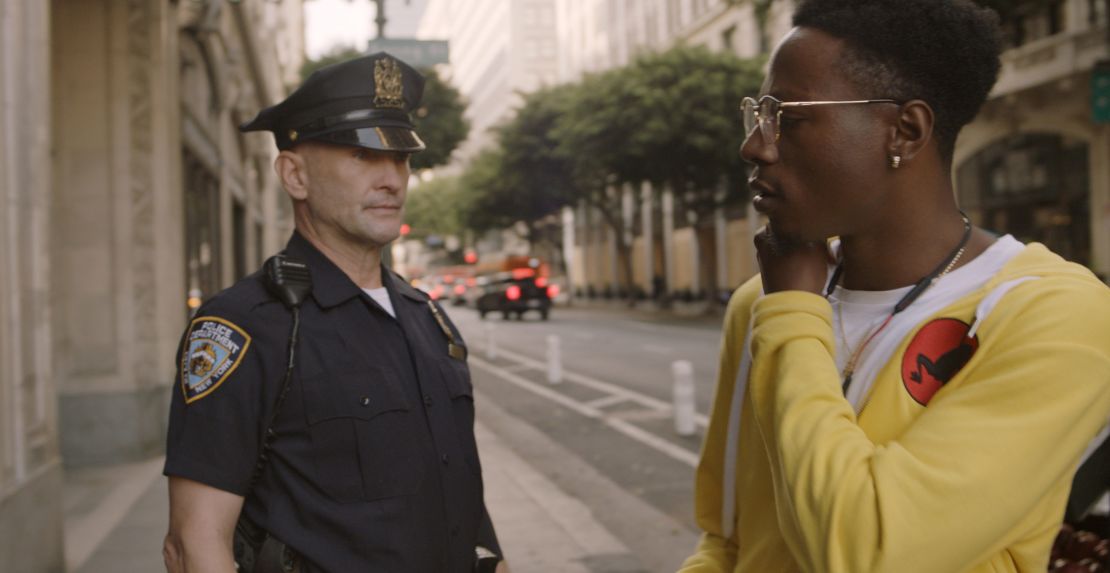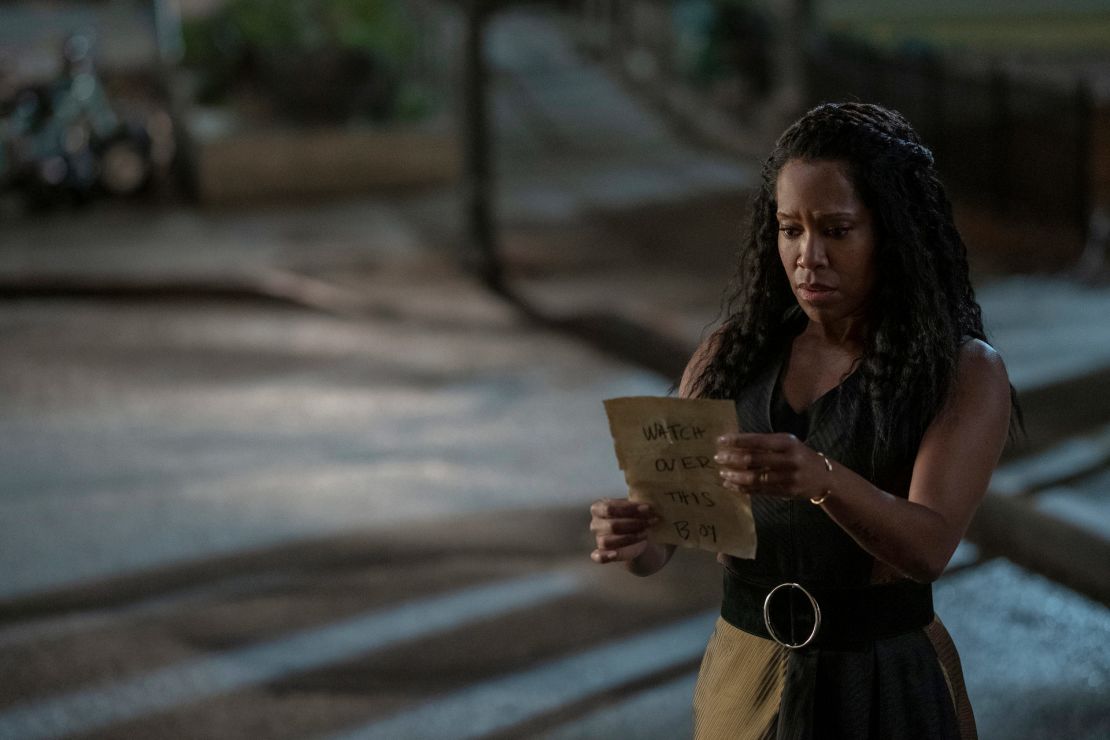Editor’s Note: Janell Hobson is a professor of Women’s, Gender and Sexuality Studies at the University at Albany, State University of New York. She is the author of “Venus in the Dark: Blackness and Beauty in Popular Culture” and the forthcoming “When God Lost Her Tongue: Historical Consciousness and the Black Feminist Imagination” (Routledge, 2021). The views expressed here are her own. View more opinions on CNN.
I remember the collective sigh of relief among a primarily Black audience that had gathered in a movie theater in the pre-Covid days of 2017 to watch Jordan Peele’s Oscar-winning horror film “Get Out.” We all released our breath just after hero Chris Washington (played by then-unknown rising star Daniel Kaluuya) had defeated his treacherous White girlfriend Rose Armitage (played by Allison Williams) who had lured him into a prison set up by her villainous middle-class suburban family.
We’d been holding our breath because the scene included a police cruiser pulling up to the premises, and we’d braced ourselves for a deadly encounter between law enforcement and a Black man. We exhaled when, instead of a White cop, Chris’s Black friend Rod Williams (played by comedian Lil Rel Howery) emerged from the cruiser to provide rescue.

Rod, having served as comic relief throughout the film, executes Peele’s well-planned intervention with humor. For us in theater that night, it restored the equilibrium of justice and also elicited raucous applause from the audience.
Interestingly, Peele disclosed in the film’s DVD commentary that he had originally planned a different ending, where our Black hero had indeed faced a White police officer and subsequently landed unjustly in prison. Shrewdly, Peele realized that after the prolonged experience of racial violence visited upon its Black male lead, audiences would have revolted against such a dark and tragic end, no matter how true such experiences are to real life.
Such an anticipated revolt seems to be playing out currently on social media as Black audiences share their grievances over the latest Black stories that are now streaming. Amazon’s horror series, “Them,” in particular, has been denounced for trafficking in Black pain and trauma, as has Netflix’s Oscar-nominated short “Two Distant Strangers.”

In this era of diverse storytelling and increasingly diverse Black storytellers, our creatives are learning to speak more directly. Stories like “Them” and “Two Distant Strangers,” as well as movies like “Antebellum” and “Queen & Slim” – also slammed for their depictions of Black pain – are learning to tell the quiet part out loud. Perhaps storytellers may need to know their audience, like Peele, but audiences too can learn to meet them halfway and appreciate different modes of storytelling. We do need more stories of Black joy and thriving, but we ignore stories of Black pain at our peril.
Unlike “Get Out” and Peele’s second horror film “Us,” neither “Them” nor “Two Distant Strangers” provides the much-needed comic relief that sometimes erupts in the horror or sci-fi/fantasy genre. Nor do these stories provide enough escapism, despite the ways both engage in realms of the supernatural: the former immersed in ghosts, the latter in an alternate reality of a never-ending loop on par with “Groundhog Day.”
History, along with inventive storytelling, seems more digestible when it is mitigated through certain storytelling devices like comic relief and escapist triumphalism. Escapism is a different type of relief, one used by such HBO series as “Watchmen” and “Lovecraft Country,” both of which visited the tragedy of the Tulsa Race Massacre of 1921 but provided vigilante justice, the former in the reimagining of “superheroes” and boss women like Regina King’s Angela Abar/Sister Night taking on the forces of White supremacy. Interestingly, the main response from many Black audiences to these dramas has been one of appreciation for empathizing with traumatic Black experience from the past.

Where humor and escapism are conspicuously absent, does this mean the storytelling has failed? I have been pondering this question because I found “Them” and “Two Distant Strangers,” both created by Black storytellers – Little Marvin with the former, Travon Free with the latter – to be compelling and brilliantly realized studies in the traumatic Black experience.
“Them” accurately captures the nightmarish pursuit of Black home ownership in the 1950s that is consistently thwarted by white Jim Crow racism, whether in the country landscape of the South or in the hostile suburban location of sunny California. It especially highlights the racial, sexual and medical assaults on Black women through its lead character, the ironically-named Lucky (played by Deborah Ayorinde) who chafes against these oppressions and is labeled the “crazy Black woman” as a result. The season finale suggests a supernatural confrontation, but it is unresolved, perhaps contributing to some viewers’ accusations of “trauma porn,” given how we are denied an escapist triumph in the end.
Similarly, “Two Distant Strangers” hits much too close to home, set in the present, and focused on one day in the life of a Black man (played by Joey Bada$$), who is racially profiled and gunned down on his way home, and is trapped in this nightmare on repeat. Again, there is no escape, for either the film’s hero or its audience, hence recreating collective emotional trauma.
However, this relentlessness doesn’t feel unnecessarily exploitative or cruel. It is realist storytelling inserted into an absurdist “Groundhog Day”-style premise, which should be absurd – but for our nation’s own grim reality. We cannot even breathe a sigh of relief when Minneapolis police officer Derek Chauvin was found guilty of the murder of George Floyd, before learning that in the exact moments Chauvin’s verdict was announced, young 16-year-old Ma’Khia Bryant was gunned down by police in Columbus, Ohio. There is no escape.
In the wake of emancipation, formerly enslaved African Americans chose silence to protect their children and grandchildren from the horrors of their enslaved life. However, the silence lingered. Loudly. Unspoken trauma is the horror subtext in “Them,” especially when young Gracie (played by Melody Hurd) guesses at her mother’s trauma of rape and infanticide shaped by White oppression, thus claiming that ghosts spilled her secret. This is how trauma is passed down intergenerationally, despite chosen silence.
This is akin to the silences Toni Morrison broke (ever so quietly) in her ghostly novel “Beloved” (adapted for film as a flawed ghost story in 1998) about that “peculiar institution” casting its long shadow on America’s race relations. As a community, people of African descent have learned to only hint at the trauma, to speak subtly about it, use coded words and double entendre for it. If we tell this pain, expect a dose of humor because we will tell it sideways, never directly.
If we’re going to heal, sometimes we have to tell our stories straight, without the filter of humor or escapism. As Hooded Justice told his granddaughter Angela Abar in HBO’s “Watchmen”: “You can’t heal under a mask. Wounds need air.” Some of our Black storytellers are finally airing the wounds.

